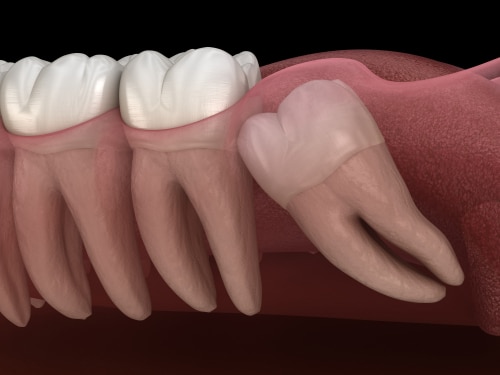Wisdom Teeth in Colorado Springs, CO
With a name like “wisdom teeth,” you might consider these molars essential to your dental anatomy. However, for many people, these teeth cause issues such as overcrowding and misalignment. At the Mini Dental Implant Center of America in Colorado Springs, we can extract problematic wisdom teeth so they do not compromise your oral health.
What Are Wisdom Teeth?
Wisdom teeth are the molars furthest back in your mouth. Also called “third molars,” they earned their nickname due to their late arrival. They typically emerge in your late teens to early twenties, a time traditionally associated with gaining wisdom. These molars are the last to emerge, symbolizing a transition to adulthood.
These teeth can be a valuable asset to your mouth when they’re healthy and properly aligned, helping you chew and maintaining your jawbone health. However, more often than not, they come in misaligned and require removal.
Nowadays, these teeth are mostly seen as unnecessary. While our ancient ancestors needed wisdom teeth to chew and bite effectively, our modern diet and eating habits have improved our chewing ability. As a result of these advancements, our modern jawbones have become smaller, meaning that most people don’t have the space for their third molars to erupt properly.
Your Wisdom Teeth: When Extraction Is Necessary
Wisdom teeth extraction is needed when your third molars are causing problems or are likely to in the future. It is typically a proactive step to ensure the well-being of your dental health and prevent potential complications or emergency removal. We typically recommend extraction in the following scenarios:
- Impaction: An impacted tooth is trapped in your gums or bone. When teeth are impacted, they do not emerge from the gums properly. This is often due to a lack of space, which can cause the tooth to develop at an incorrect angle that can damage other teeth. Impacted teeth can result in pain, swelling, and infection of the gum tissue surrounding the tooth.
- Infection: Partially emerged wisdom teeth can be hard to see and clean, making them more vulnerable to cavities and gum disease. Extraction reduces the risk of oral health issues, such as decay and gum disease, in these hard-to-reach areas.
- Overcrowding: If there’s not enough room in the mouth for the wisdom teeth, they can cause crowding, which leads to misalignment and discomfort.
The best way to prevent any of these issues from arising is to attend regular dental checkups. At your routine visits, Dr. Bashi can monitor the progression of your wisdom teeth to ensure you never experience any discomfort.
Wisdom Teeth Extraction Process
 There is nothing inherently wrong with wisdom teeth—they are just like your other teeth. However, for most people, they will cause problems. Our goal is to remove them before they have the chance to do so. Timely removal of problematic wisdom teeth is especially necessary for individuals who have had braces or other orthodontic treatments. If your wisdom teeth don’t have room to emerge properly, they can push your other teeth, causing crowding that can destroy your previous teeth straightening efforts.
There is nothing inherently wrong with wisdom teeth—they are just like your other teeth. However, for most people, they will cause problems. Our goal is to remove them before they have the chance to do so. Timely removal of problematic wisdom teeth is especially necessary for individuals who have had braces or other orthodontic treatments. If your wisdom teeth don’t have room to emerge properly, they can push your other teeth, causing crowding that can destroy your previous teeth straightening efforts.
Consultation
At your initial consultation, Dr. Bashi will determine whether your wisdom teeth need extraction. He will use advanced imaging techniques to evaluate the position of your wisdom teeth and their impact on the jawbone. Dr. Bashi will also ask you about your medical and dental history and any symptoms you may be experiencing.
If extraction is necessary, we will create your personalized treatment plan, provide detailed instructions about the procedure, and schedule your oral surgery. You will have the chance to ask Dr. Bashi any questions about the procedure and recovery.
The Extraction Procedure
Frequently Asked Questions
Wisdom teeth extractions are often performed during the late teens or early twenties when the teeth start emerging. According to the American Association of Oral and Maxillofacial Surgeons, it is easier to extract wisdom teeth in younger patients because the roots haven’t formed entirely, the bone is softer, and there is less risk of damaging nerve structures. However, patients can have their teeth removed at any age if they start to cause problems.
Protecting the blood clot that forms in your empty socket is one of the most important factors for ensuring a smooth recovery. The blood clot protects the socket and underlying bone. If you dislodge the clot, you may experience a painful condition known as a dry socket.
After extraction, we recommend avoiding strenuous exercise, smoking, using straws, and consuming hot or spicy foods since these can disrupt the blood clot and irritate the extraction site. It is also important to be cautious with your oral hygiene routine and follow Dr. Bashi’s post-surgery instructions.
The recovery window varies from patient to patient and depends on the number of teeth removed and the complexity of the surgery. However, recovery generally spans one to two weeks. Some patients can return to their regular routines in three to five days.
After your procedure, Dr. Bashi will give you post-operative instructions and an estimate of your recovery time based on your treatment needs.
